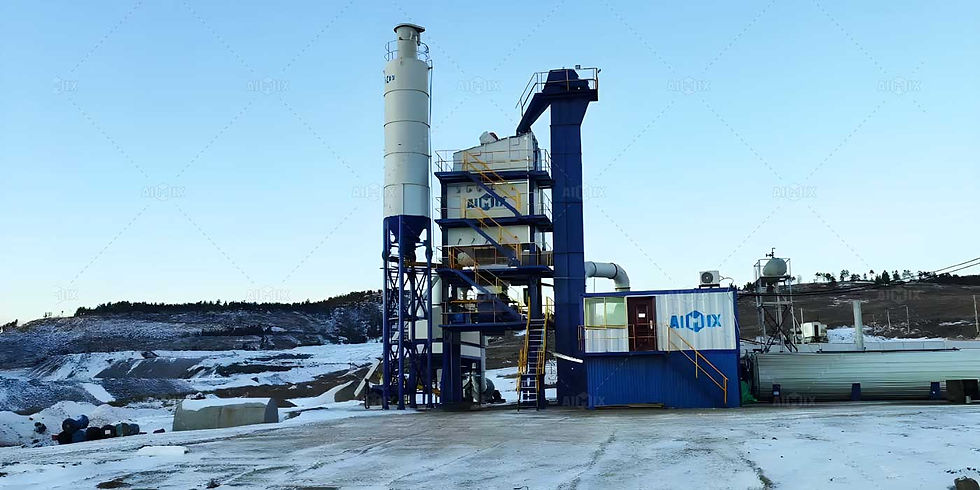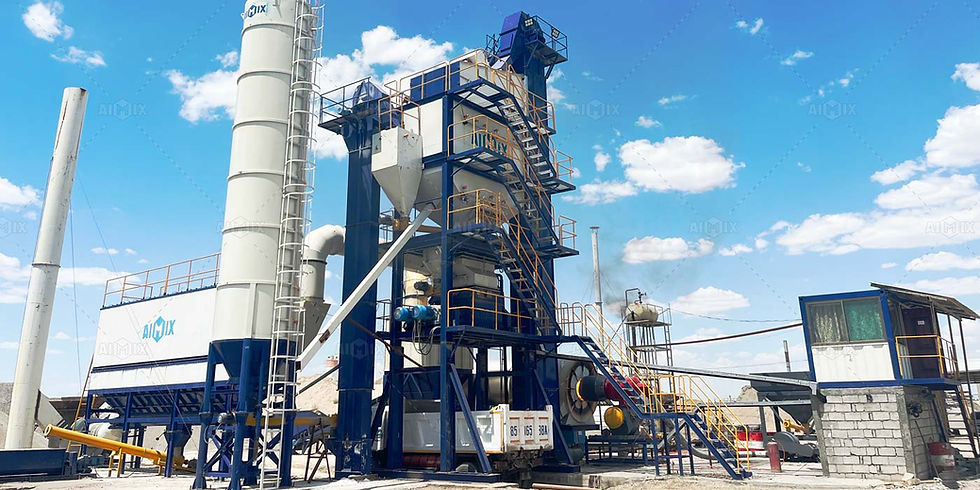How Can I Balance High Production Capacity and Mobility in an Asphalt Mixing Plant?
- aimixglobal5
- Nov 10, 2024
- 3 min read
For many construction projects, especially those in rapidly developing areas like Indonesia, balancing high production capacity and mobility in an asphalt mixing plant is a key challenge. Contractors must manage to produce large volumes of asphalt while ensuring that the plant remains versatile enough to be easily moved between job sites. This balance is crucial for project efficiency and cost-effectiveness. But how can this be achieved? In this article, we explore strategies and tips to strike the right balance and help you make an informed decision when choosing your asphalt mixing plant.

Understanding the Need for Both High Production Capacity and Mobility
Construction projects require consistent, high-quality asphalt in large quantities. However, in areas with tight spaces or congested urban zones, having a fixed, large-scale asphalt plant may not be feasible. This is where mobility becomes essential. At the same time, construction projects often need to operate on a large scale, requiring plants capable of producing asphalt at high volumes within tight deadlines.
It’s important to recognize that the most suitable plant will depend on the specifics of the job. Projects in rural areas or those with unpredictable weather conditions may require mobile plants, while high-demand, urban projects will benefit from larger, stationary plants.
Key Features to Look for in Asphalt Mixing Plants
When balancing production capacity and mobility, certain features can help you get the best of both worlds. Understanding these features is crucial in choosing the right asphalt mixing plant for your needs.
1. Mobile Asphalt Mixing Plants
Mobile asphalt mixing plants are designed to be compact and easy to transport. This makes them ideal for projects that require frequent relocation. With modular designs, these plants can be quickly set up and dismantled, saving time during transitions between job sites. However, while mobility is a strength, these plants tend to have lower production capacities compared to their stationary counterparts. Despite this, advancements in mobile asphalt mixing technology have allowed manufacturers like AIMIX to create plants with optimized designs that offer a significant balance of both capacity and mobility.
2. Stationary Asphalt Mixing Plants
Stationary asphalt plants, on the other hand, offer high production capacities and are perfect for long-term, large-scale construction projects. The stationary asphalt mixing plant can consistently produce asphalt at high volumes with minimal downtime. However, they are not easily moved, which can be a challenge in projects that require flexibility or have space limitations. Even so, stationary plants are generally more suited to large infrastructure projects where consistent, high-quality asphalt production is paramount.

Optimizing Mobility and Production Capacity
Finding the sweet spot between mobility and production capacity involves selecting the right equipment that can meet both needs without compromising efficiency. Here are a few ways to optimize both factors:
1. Modular Plant Design
One of the most effective ways to balance production capacity and mobility is through modular plant design. AIMIX’s innovative modular plants can be expanded or scaled down based on project size and requirements. This flexibility allows you to easily adjust capacity while maintaining the plant’s mobility. By selecting a mobile asphalt mixing plant for sale that can be configured to meet project demands, you can avoid overpaying for unnecessary features while maximizing productivity.
2. Advanced Automation Features
Advanced automation in asphalt mixing plants allows for more efficient operation, even in mobile models. Automation minimizes human error and speeds up production, meaning you can get the job done faster without sacrificing quality. As a result, mobile plants with automation can approach the production capacities of larger, stationary models, providing greater flexibility in project execution.
3. High-Quality Materials for Durability
Durability plays a significant role in maintaining high production capacity while on the move. Choosing asphalt mixing plants made from high-quality materials ensures that the plant can withstand constant transportation, frequent setup and breakdown, and extreme weather conditions. AIMIX’s asphalt mixing plants are designed with durable components that extend the plant’s lifespan and keep it operational longer, reducing maintenance costs and downtime.

Making the Right Choice: AIMIX Asphalt Mixing Plants
When it comes to balancing mobility and production capacity, AIMIX is a leading provider offering solutions that address both needs. Their asphalt mixing plants combine cutting-edge technology, durability, and flexibility. Whether you need a mobile plant that can be quickly set up and moved or a stationary plant with high output, AIMIX has a wide range of options to suit your specific requirements.
Conclusion
Choosing the right asphalt mixing plant involves understanding the balance between high production capacity and mobility. By opting for modular designs, advanced automation, and durable materials, you can optimize your plant’s efficiency and ensure its adaptability to any project. If you’re looking to invest in a high-performance asphalt mixing plant, AIMIX provides excellent options that meet both production and mobility needs. Contact AIMIX today to discuss your project requirements and find the ideal solution for your construction needs. For more information: https://aimixgroup.com/asphalt-mixing-plant/batch-type/



Comments